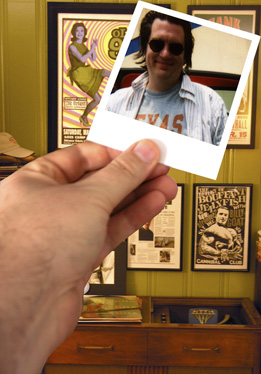
I was expecting something a little more dramatic as I walked down the Trinity Trail near the Rogers Avenue bridge. Bulldozers. Chainsaws. Contractors from Blackwater.
A friend sent me an e-mail this afternoon that the Trinity Trees were coming down. I guess I expected it to be a work in progress. But it was a done deal.
What I found was an open area where Chesapeake Energy's pad site will be, along with blue sky and silence. No one was there. The only noise came from the Union Pacific yards next door.
After months of meetings, petitions, letter writing and lawsuits, the Trinity Trees controversy was over. I guess spokesperson Julie Wilson is still polishing the press release that says, "Hey, we just cut down a bunch of trees."
I had hoped against hope that some Capra-esque miracle would transpire. Maybe like Claude Rains at the end of Mr. Smith Goes To Washington, Chesapeake Vice President Tom Price would go sprinting down the Trinity Trail, racked with guilt while tearing off his Men's Warehouse suit and screaming, "I was wrong! Global warming does exist! These trees must be SAVED!" But that hope died even before the ink was dry on Melissa Kohout's lawsuit.
But that hope died even before the ink was dry on Melissa Kohout's lawsuit.
The realistic view was best articulated by Jim Marshall. A few months back, Jim told me that in spite of everything, there were positives to come out of this:
Saving over an acre of old growth trees ain't nothing. Getting Chesapeake to part with $500,000 for trees ain't nothing, either.
And I was thinking about that while I walked the Trinity Trees site this afternoon. It's a perfect example of what Lyndon Johnson called "half-loaf" politics -- a half a loaf of bread is better than no loaf at all. It's compromise. Everybody wins.
Well, there certainly were some winners.
Someday soon, a drilling rig will reach to the sky alongside the old oaks on the banks of the Trinity. And someday not long after that, the money will flow into the coffers of Chesapeake Energy, Union Pacific and Colonial Country Club.
But what about the rest of us here in Fort Worth. You know, the people who are concerned about keeping our neighborhoods safe, maintaining our natural environment and other little things like that. What about us? Did we get a half a loaf out of this? Because doesn't seem like it.
Then I remembered something that someone said to me recently. "Why is it that whenever there is some sneaky shit going on with gas drilling, Chesapeake's name is on it?"
Um, I dunno? Maybe because of the Trinity Trees, injection wells, the proposed Eighth Avenue drilling site, signing a drilling lease with the Star-Telegram.
 And that's when it clicked for me.
And that's when it clicked for me.Like a rebellious teenager, Chesapeake pushes the limits to see what it can get away with. Maybe Fort Worth will say no to a few things, they figure, but who knows what that town will say yes to.
But no matter how many billboards Chesapeake buys, the people of Fort Worth have started to notice this pattern of behavior. They are judging Chesapeake on their deeds, not their dollars. And those deeds may have already cost the company some dollars.
I believe the Trinity Trees issue hurt Chesapeake in lease negotiations in Mistletoe Heights and Ryan Place. I also believe that the Trinity Trees helped get the gas drilling ordinance back on the table. Who knows, maybe we'll end up with an ordinance that does more to protect our interests, not the gas drillers.
If that's the half of the loaf we got, Fort Worth, that ain't nothing.








